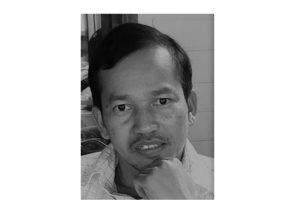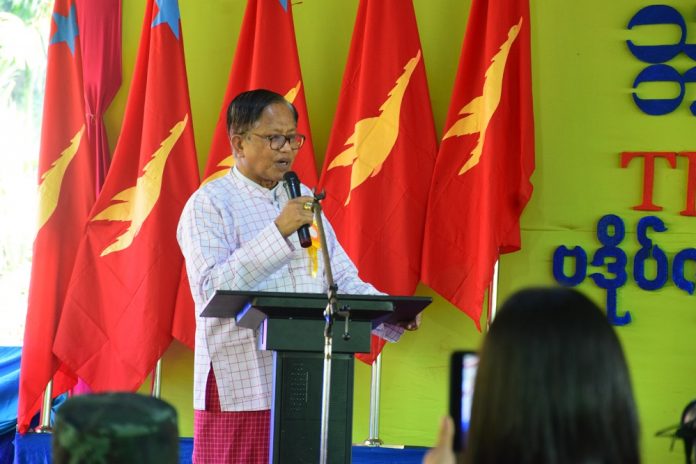Justice is not always provided to people and people are too often oppressed by their rulers. This is how Nai HongSar, the current Chair of the New Mon State Party, has viewed the world.
As a young man he could not tolerate the unfair treatment he witnessed for local people in his birth place. He left his parents and rejected a job offered by the local government. He embarked on a journey to restore justice, liberty and the rule of law in the county. He had only two pairs of shoes, a blanket and a spare cloth in his school bag. After fifty years on his life’s mission, still in youthful look but now a wise man, Nai Hongsar has become the new Chair of the New Mon State Party.

Nai HongSar’s achievement is long overdue and celebrated at home and abroad by raising the Mon National flag.
He is known as ‘Ajar HongSar’. A man with balanced views and faith in the people’s movement.
I am honored to compile this personal reflection of someone who has demonstrated dignity, integrity and commitment to human justice. This is a profile of the gentleman, the revolutionary soldier, the writer, poet, and leader for all seasons in the 21st century in Monland, lower part of Myanmar.
Ajar (Master), Nai Hongsar has spent half a century in the jungle, and over eighteen thousand days and nights in the revolutionary movement. He is well-known to Mon people for his soft spoken, polite and respectful manner with his colleagues.
Nai Hongsar has served as an elected a member of the Central Committee to the New Mon State Party since 1971, a few years before Mon State was created by the current dominant ethnic Burmese led, Union government.
Burma was still under military rule in 1962 during his high school years. As a young man, he rejected the Burmese government’s control of local Mon people affairs. He left his birth place, Paung Township in Mon State and headed to liberated areas controlled by the Mon National Liberation Army. Nai Hongsar was one of the youngest men who left home for the jungle and enlisted as a ‘revolutionary soldier’. He was mentored by prominent two leaders of the Mon revolutionary movement, [late] Nai Shwe Kyin, Chief founder of New Mon State Party and [late] Nai Non Lar, Deputy Chairman. Nai Hongsar mastered the fundamental rules of military operations in the late 1960’s. As Chief Mon insurgency leader his troops were attacked by the Burmese army in 1973 and he suffered a battle injury.
Between 1975 – 1978, he was appointed as Deputy Governor of Moulmein (Mawlamyine District), where he administered local issues under the administration of the New Mon State Party.
He was promoted to represent the New Mon State Party as one of the founding members of the National Democratic Front (NDF), an alliance of Ethnic Armed Resistance Forces in 1982. He was appointed as General Secretary of the Front and received acknowledgements from Mon and other ethnic people as a man of sincerity and politeness, while also being a strong, sharp voice advocating political liberation from ethnic Bamar rule.
Ajar Nai Hongsar knew first hand the struggles facing Burma including widespread poverty, corruption, and the oppressive abuse of power, led by the then Burma’s Socialist Program Party led by military general Ne Win.
Nai Hongsar was an instrumental member of the united front known as the Movement for Democratic Change that operated in the country[‘s liberated area] between 1982 to 1985. After the country’s nation-wide democracy movement in August and September of 1988 that ended the one party political system tied to Burmese Army, Nai Hongsar convened a democratic alliance conference, in liberated area.
Many of the newly liberated students, ethnic young men, armed ethnic leaders and prominent politicians who had fled or feared imprisonment or arbitrary detention under Gen. Saw Maung, attended the conference. Here, Ajar Nai Hongsar was appointed as General Secretary to the newly formed Democratic Alliance of Burma (DAB). DAB was formed on the 18th of November 1988, and included 21 ethnic armed groups and democratic forces with the objective to bring about peace, human rights, democracy and a federal union within Burma.
Ajar Nai Hongsa has long been supportive of changing our nation’s name from Burma/Myanmar to a new name agreed by diverse ethnic peoples’ desire such as the “Golden Land‘ or otherwise, because the new name allows for the aspirations of non-Burmese ethnic people’s historical perspective. .
Ajar Nai Hongsar also maintained an intra-ethnic diplomatic role in Karen’s liberated area for more than ten years between 1982 – 1995. Unfortunately, Mon and Karen relations were not always smooth. The New Mon State Party and its armed wing were forced to leave the Three Pagoda Pass area after heavy battles between the Mon and Karen in July 1988 and again a heavy fighting between Mon Army and Government Army in January – February of 1990.
Ajar Nai Hongsa returned to the headquarters of the party in Ye River’s zone where he proposed a Mon National Conference and participated in efforts to re-group its armed forces and establish control over Mon territories.
The New Mon State Party explored alternative ways to achieve its political objectives via the cease-fire agreement with the ethnic Burmese government in June 1995. Although Nai Hongsa was not selected to lead NMSP negotiation team he did propose a new model of the Mon political movement.
Ajir Nai Hongsar, along with senior leaders of the party convened a Mon National Affairs Seminar in late 1995. Subsequently a new Mon Political Alliance was formed under his chairmanship. The alliance was named the Mon Unity League, an umbrella organization of all Mon non-armed movements based domestically and abroad,especially Mon people based in Thailand.
Not only is Ajar Nai Hongsar an accomplished leader, he has also published over ten books in both Mon and Burmese and has composed a Mon song. I have read Ajar Nai Hongsa’s books, poems, articles and speeches as a young boy, (journals can be found via an under-ground network). I recall one night when a heavy battle between the Mon Army and Burmese troops was taking place in Three Pagoda Pass in January 1990, he visited the local village’s monastery where I was staying with my mentor, a senior monk.
Ajar was calm, steady and discussed with my mentor a retreat plan. Six years later, I again met Ajar Nai Hongsar during a Mon National Affairs Seminar in 1996 where I was reporting for the Mon News Bulletin (Bop Htaw News) based in Bangkok. Then, as now he has maintained a balance in his world views and on the issues of nationalism. He is committed to achieving self-determination for the Mon people and is hopeful that federalism will address the countries’ diverse ethnicities.
Ajar Nai Hongsar visited Australia in 2018 to deliver a keynote speech at the Mon Democracy and Peace Forum in Canberra, Australia. While there he visited with many Mon families, local institutions, and observed the fruits of ‘democratic rules and federalism’.
He was appointed as General Secretary of the New Mon State Party in 2003 and as Deputy Chairman in 2013. He is fully engaged with local non-armed Mon political movements at home and abroad because of his belief that the non-armed movement can help bring about democratic change.
After half of the century in the jungle, serving as a revolutionary soldier, Ajir Nai Hongsa has emerged to take a leading role for the Mon political movement led by the new Mon State Party.
He will not contest the 2020 general election nor is the NMSP registered with the electoral commission. However, a truly democratic political process that leads to federalism now marks the way for Ajar to care for the Mon people’s aspirations.
He has held guns but now prefers the power of the pen. We will see him in the coming years constructively engage with other prominent non-armed democratic leaders and signatories to the National Cease-fire Agreement (NCA). Along with members of New Mon State Party’s Executive Central Committee he remains firm in his commitment to implement both peace and federalism. While he never surrendered his guns to the ethnic Burmese government, he now holds a sharp pen poised to fight for justice, liberty and self-determination and a genuine federalism for the country through an amended constitution.

